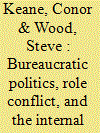| Srl | Item |
| 1 |
ID:
143282


|
|
|
|
|
| Summary/Abstract |
Among the many challenges confronting the United States and its allies in Afghanistan were cohesion and communication problems in state-building programs. Merging role theory and bureaucratic politics approaches, this article argues that US Provincial Reconstruction Teams (PRTs), the composite groups charged with implementing these programs, suffered from incompatibilities between sectors of government, among which the military was dominant. US PRTs were affected by role conflict, resulting from varying and often competing organizational cultures with divergent role conceptions.
|
|
|
|
|
|
|
|
|
|
|
|
|
|
|
|
| 2 |
ID:
174734


|
|
|
|
|
| Summary/Abstract |
Indonesia has developed an internal model of reconciling the values of democracy and Islam; therefore it could pursue international activities for bringing the West and the Islamic world together. However, Indonesia’s international role as a bridge-builder between democratic values and Islam has limited effectiveness. In this paper the attempt is to investigate why Indonesia’s international activity as a bridge-builder between the West and the Muslim world is ineffective? The analysis shows, and this is the argument, that its limited effectiveness results from a conflict between the country’s conception and prescription roles. The assumptions are that Indonesia’s underlying objective in its foreign policy is to provide a tool for reconciling the West and the Muslim world (role conception); however an enactment of this role is affected by a dissonance between the authors of this role. The paper examines three empirical case studies at different levels of Indonesia’s external engagement: (1) civilizational and interfaith dialogues at the international level; (2) the Organization of Islamic Cooperation and Developing-8 at the inter-regional level; and (3) the Bali Democracy Forum at the regional level.
|
|
|
|
|
|
|
|
|
|
|
|
|
|
|
|
| 3 |
ID:
170750


|
|
|
|
|
| Summary/Abstract |
This article explores the scope conditions of national role conceptions as reference points for foreign policy decision making during crises. It aims to contribute to a refined perspective of the agency of new states undergoing socialization processes in relations with significant others. Drawing on a primary material consisting of interviews with Georgian and US officials, the article analyzes the significance of Georgia’s role conceptions in the country’s relations with the USA in relation to two major crises: the 2007 riots in Tbilisi and the 2008 war with Russia. The article posits that crises provide situational circumstances where the requirements of appropriate behavior associated with role expectations may enter into conflict with the demands of the immediate situation. In order to resolve ensuing role conflicts, actors face the need to both rationalize role expectations, and to compensate for departures from them. In turn, these strategies relate to the possibility for change and stability in role conceptions, and by extension their enactment in foreign policy. The analysis of the Georgian government’s management of the two crises demonstrates actions that implied both rationalization and compensation, aiming to retain the credibility of its existing role conceptions in the eyes of its US counterparts.
|
|
|
|
|
|
|
|
|
|
|
|
|
|
|
|
| 4 |
ID:
189986


|
|
|
|
|
| Summary/Abstract |
In recent years, scholars have devoted increased attention to the notion of roles in foreign policy analysis and international relations. However, role theory literature has so far less frequently explored re-conceptualising role conflict. To further understand the concept of role conflict, this article aims to unpacks the notion of international audiences. To do so, this article advances the application of role conflict by arguing the importance of notion of vertical role conflict that considers the different levels of international audiences, specifically regionally and globally. Building upon the symbolic interactionist conceptualisation of social interaction as a stage, regional and global levels can be seen as arenas for role-playing but with different expectations to fulfil. The article proposes two types of vertical role conflict, stemming from the difference between the regional and global levels. These theoretical claims will be elucidated through the study of Indonesia’s regional and global engagement in two areas: human rights and trade.
|
|
|
|
|
|
|
|
|
|
|
|
|
|
|
|